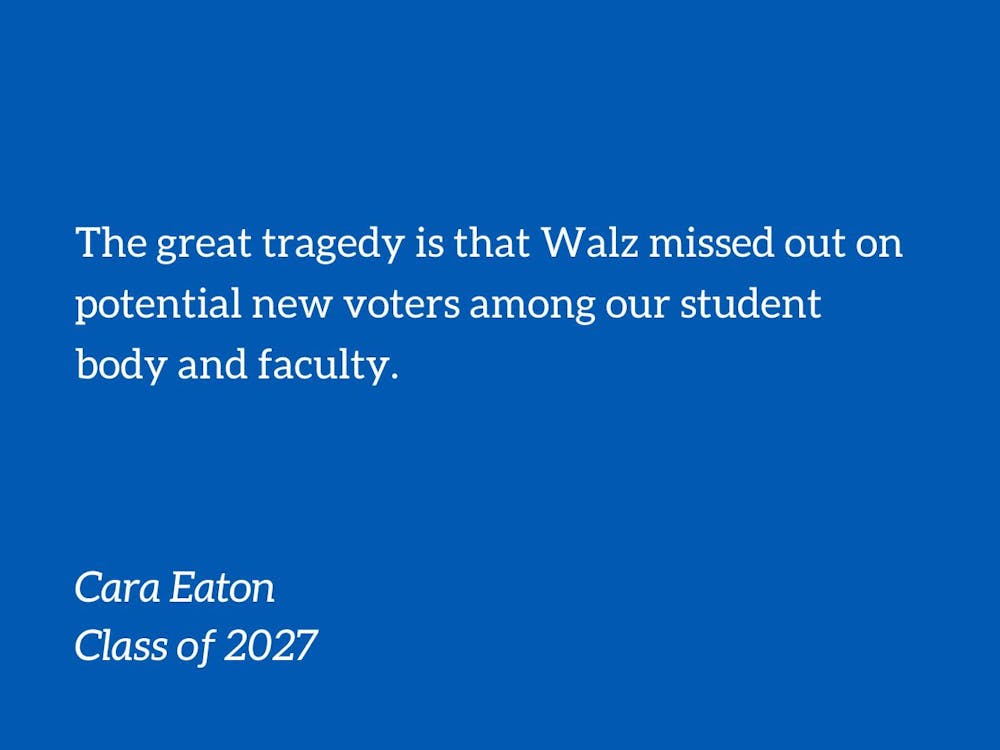Logistically, events often require an attendance cap. Deciding who can attend through a pre-organized method — like having prospective attendees fill out a form — is logical and helps beat the chaos of the day-of ticket rush. Not everyone can attend every event, and that’s okay.
Tim Walz hosted a rally at Duke on Thursday, October 24. It was a momentous occasion heralded by much excitement on campus. The attendees with whom I spoke afterward gave rave reviews. Yet, throughout the day, most students said something else: “Yeah, I would’ve loved to see him, but I didn’t know how.” A few even confided they didn’t know the event was happening.
I knew it was happening, but I didn’t go. I learned about it through an Instagram post from the Duke Democrats, the group responsible for the event. (Kudos to them, by the way, for successfully hosting a vice presidential candidate — I commend the students involved.) To attend, you had to RSVP using a link, reasonably so. However, a line in their post description paused me: “... you have to receive an invite to attend after submitting the form.”
What exactly is an “invite” in this context? Does it function just as a confirmation that you registered for the event, or was it an invitation in the pure, selective sense? The fear of the latter could be enough to dissuade many people interested in attending from registering if they feel as if somehow they aren’t qualified to go. An honest investigation into how these “invites” work is unimportant for the main point of my argument; any vague suggestion of a selective process functions psychologically identically for hesitant attendees as actual selection. So here was my predicament: I’m not a part of the Duke Democrats or a party Democrat; the language around the event dissuaded me, but I would have loved to see Tim Walz.
Well, you could say, it is a rally, not merely a speaking event. Such things target dense crowds of supporters, so it’s only natural to try to drum up such support here. Sure, that’s the platonic ideal of the rally. In reality, political rallies accommodate anyone and everyone: opposition, questioning voters and the casually interested citizen. Wouldn’t it be practical to use that model for our rally?
Maybe event organizers were concerned that Walz would have to face hecklers. However, dealing with protestors is part and parcel of being a politician. Campaigning in La Crosse, Wisconsin, earlier this month, Kamala Harris deftly responded to a pro-Trump heckler by replying, “You guys are at the wrong rally … I think you meant to go to the smaller one down the street.” Career politicians are trained to respond to hecklers and can even use them as an opportunity to display their wit and unflappability, as Harris did. A Duke student, faculty member, or associate (invited or otherwise) likely doesn't exist who would insult or disturb Walz in a way he hasn’t already encountered. Besides, I’m reasonably confident that the worst thing to happen to a candidate at a rally this election already transpired in July.
For us unaffiliated outsiders, the method to screen those approved to attend the rally is unclear (as is, to be clear, the existence of any screening process). If “invites” were decided by actual membership in the Duke Democrats, by word-of-mouth association, or some other method, there’s absolutely no guarantee that any of those approved wouldn’t have gone rogue besides the threat of heavy security. This threat of heavy security should be enough to believe in cooperation from the general Duke community; thus, the trouble of “invites” could have been spared. There are real-world public trust and accountability issues here, and they are a fitting framework for our university event.
The great tragedy is that Walz missed out on potential new voters among our student body and faculty. In my view, anyone who is a part of the Duke Democrats or has been invited, assuming exclusivity, is almost certainly already voting for Harris-Walz. Walz probably did not gain significant new voters from this event besides those possibly garnered from the resulting press and media. A buzzy room plus a firsthand account of Walz’s promises of a better America could have persuaded some to vote blue. The rally was doubly a missed opportunity — it could have been strategically beneficial for Walz and personally transformative for non-affiliated students and undecided voters.
I chatted with a faculty member about this matter. She hypothesized that if the event organizers didn’t limit the event and instead tried to make it a community-wide experience, public pressure would mount to host speakers from the other side of the aisle (like Walz’s current opposition).
Although these right-wing speakers don’t align with my politics, I don’t think hosting them is such a bad idea. Duke students deserve the totality of facts leading up to this election. A diverse series of speaker events with a clear open attendance policy is the way to do so most fairly, meaningfully and potentially transformatively. The issue of limited seat availability should be decided on a strictly first-come, first-served basis, agnostic to the apparent political beliefs of the tentative attendee. Let security maintain candidate and student safety. Let these events accommodate a melting pot of classmates U.S. with different beliefs. Let the candidates enjoy, at worst, a few hecklers and, at best, a crowd of persuaded young voters and potential party members down the line.
The Duke rally did not decide a Harris-Walz victory or loss. It also likely didn’t cost them any voters, but it didn’t earn them any new ones, either.
Cara Eaton is a Trinity sophomore.
Get The Chronicle straight to your inbox
Sign up for our weekly newsletter. Cancel at any time.

